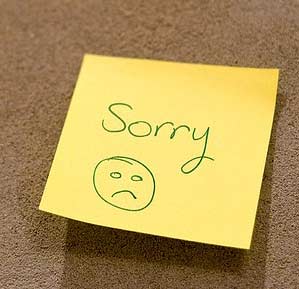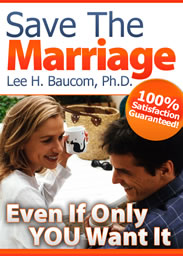Secrets To Save Your Marriage
https://savethemarriage.com/stmblog/wp-content/themes/corpus/images/empty/thumbnail.jpg 150 150 Lee H. Baucom, Ph.D. Lee H. Baucom, Ph.D. https://secure.gravatar.com/avatar/669b7e375d93f77521ddaba08adb8063?s=96&d=blank&r=pg As you may suspect, after a quarter century of working with couples, I have some opinions on what it takes to save your marriage. In this article, I want to take a look at some of the research and offer some opinion, from my experience, on what works and what doesn’t.
As you may suspect, after a quarter century of working with couples, I have some opinions on what it takes to save your marriage. In this article, I want to take a look at some of the research and offer some opinion, from my experience, on what works and what doesn’t.
Let me start by saying there is one major distinction between marriages that are saved and marriages that end: ALL of the marriages that are saved have someone who took action.
Just for clarity and disclaimer information — I am not under the delusion that every marriage can be saved. But I do believe that many more marriages could survive and flourish, if given the chance.
But often, a spouse doesn’t want divorce, but doesn’t know what to do. So, the spouse starts on a process of education. He or she reads, listens, watches, and learns. . . and then does nothing to change the relationship. Knowledge is only power when it is applied.
Then there are those that find lots of information — and some of it is conflicting. So they start in one direction, then read something else and start in another direction, then hear something and head off in another direction. Instead of doing nothing, they do everything!
The person who does nothing is showing the spouse that he or she doesn’t care — even though that is completely untrue. Certainly not a sentiment you would want to portray.
The person who does everything appears inconsistent and manic. Often, this becomes proof to the spouse that things really are bad — and their spouse is erratic. Imagine, for instance, that one piece of advice says to be warm and welcoming. You do that for a couple of weeks. Things don’t change, so you read about trying to make your spouse jealous and make them feel your absence, so you reverse your actions 180 degrees. Don’t you think your spouse will be thoroughly confused?
So let me suggest you find the best advice possible, something that agrees with your gut, and then stick with it, applying it to the best of your abilities!
Which brings me to secret #1: Be consistent in your approach — and be sure the approach is not being passive!
How to Save Your Marriage
It is my advice that you NOT work on making your spouse jealous. I have seen that advice all over the internet. And let me tell you a secret: NONE of that was written by a qualified professional.
It was written to make someone feel better on taking out their anger on a spouse. That part of you that is hurt and angry? In some ways, we want to hear about how the best action is to go have fun, to “teach them a lesson.”
But the lesson it teaches? “I have moved on.” That, I would suggest, is not a winning strategy for showing “I love you and want our marriage to work.”
Which leads me to secret #2: People who save their marriage set aside their momentary feelings for a greater good. Because there are going to be times when your hurt leads you to want to lash out. You will WANT to give up. But if your mind is committed to saving your marriage, don’t let your emotions pull you off-course.
My wife uses the phrase, “consult your plan, not your feelings.” In other words, once you have formulated a plan, then stick with it, even when your feelings are telling you differently.
Watch this video for some more help on this:
Save Your Marriage
Your secret #3? Assume you WILL save your marriage. In other words, instead of always questioning what is possible, just decide you will do exactly that: save your marriage.
I teach SCUBA diving in the local area, and my partner in teaching starts out our first class with one request from participants: PMA. Positive Mental Attitude. In class, we ask the students to stretch themselves. After all, it is not second-nature for us to breathe under water. And some of the exercises requires the student to get beyond the fear. Not to get rid of the fear, but get beyond the fear.
So we ask participants to refuse to play the “I can’t” tapes in their mind, and choose instead to say “I can.” It is incredible to me to watch people talk themselves through an exercise by using that phrase over and over.
It is the same in dealing with a crisis. I get letter after letter from people asking “can I save my marriage?” I only want two changes. First, I want someone to say “I CAN save my marriage.” Then, I want the person to ask “how can I save my marriage?” Suddenly, a shift has happened.
Tips to Save Your Marriage
At this point, you have hopefully made some shifts in your thinking. Now you know it is possible to save your marriage. But you may need some nudges on where to go from here.
 Secret #4: Saving a marriage is about a) reconnecting and b) working on yourself. Both are required.
Secret #4: Saving a marriage is about a) reconnecting and b) working on yourself. Both are required.
Marriages get into trouble because there is too little connection in the marriage to sustain it. A lack of connection leads to what John Gottman refers to as the 4 Horsemen Of The Apocalypse.
These “Horsemen” are traits of communication that arise between distressed spouses. Here they are:
1) Criticism – One or both begin to be overly critical and attacking about perceived shortcomings. Forgiveness begins to wane.
2) Contempt – Then arises the sense of contempt that one or both holds for the other. Contempt is marked by only seeing the worst in the other and becoming suspicious about every action from the other.
3) Defensiveness – The contempt is felt and experienced as attack, which leads to a defensive reaction. And when we are defensive, we have a very difficult time seeing our own role in the process
4) Stonewalling – The defensiveness leads to the final marker. When we realize we cannot talk something out, we choose not to interact. We stonewall, refusing to communicate to the other.
Click Here for a video of Gottman discussing this.
To be clear, most marriages have, at some point, elements of these “4 horsemen.” But the more distressed a relationship becomes, the more consistent these patterns become, until the patterns are engrained and automatic.
Which calls for the process of reconnecting. As marriages reconnect, there is less and less of the pattern. And self-improvement allows for one to acknowledge a truth of being human: we all have room to grow and improve. We all have places where we have allowed our more fearful brains to take over and hold us hostage.
Time to reconnect and time to grow!
Ways to Save Your Marriage
Let me provide a little insight on how to start the process with a video I created:
There are a couple of important details. First, notice I do not suggest you sit down and have a “heart-to-heart” with your spouse. It will fail. You will not talk your spouse out of feeling that the marriage is in trouble.
But more than that, when you are talking about the relationship, you are no longer relating. And when you are not relating, you are not connecting. So, give up on that big relationship talk you have been rehearsing in your mind.
Second, don’t panic. Resist begging, demanding, guilting, or any other negative display of emotion. You don’t have to appear cheerful. Being sad is fine, but large expressions of emotion generally only prove the point to your spouse: they need to get away. So resist. Stay calm.
Stop Your Divorce
That, in my mind, is only step one. Stopping the legal process is the beginning point to building a marriage that you treasure — that both of you treasure! When you get to that point, then your marriage is sustainable for the long-term. More than that, it will be nurturing to both of you. And both of you will protect it.
If you are ready to really create a plan, to really get serious about marriage, I invite you to grab my Save The Marriage System. You CAN save your marriage, even if you are the only one wanting to right now!







